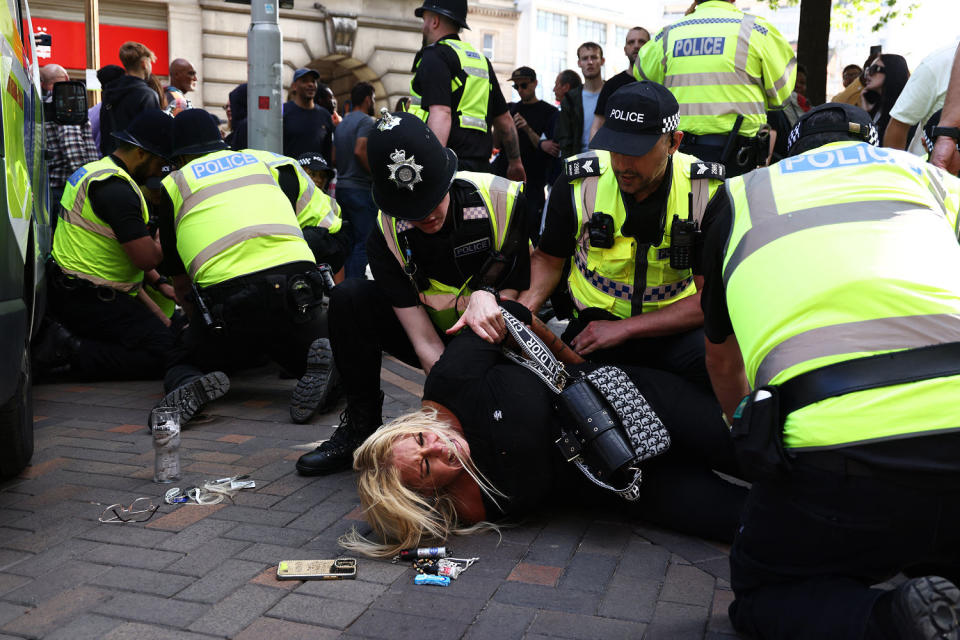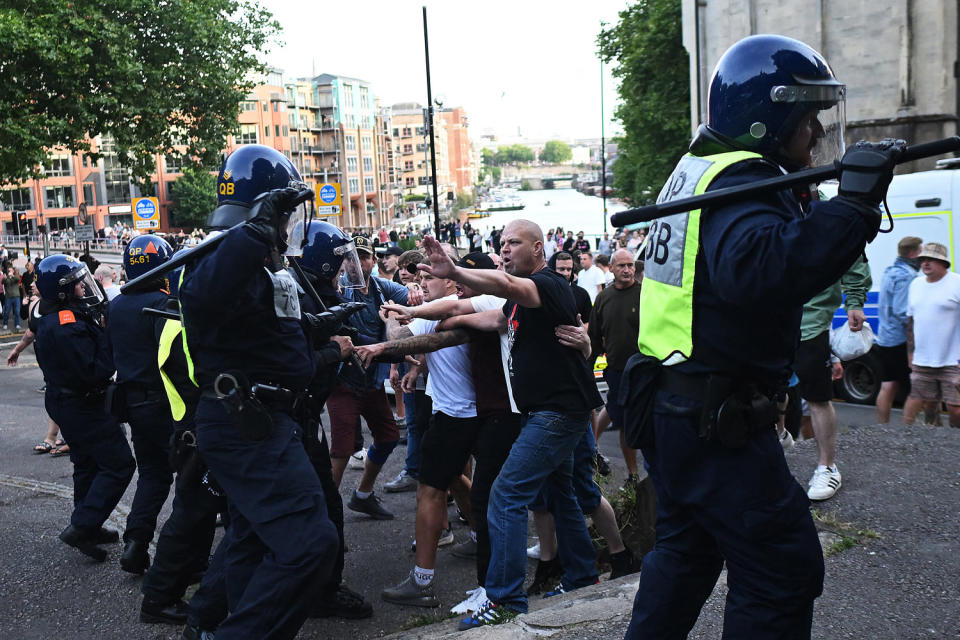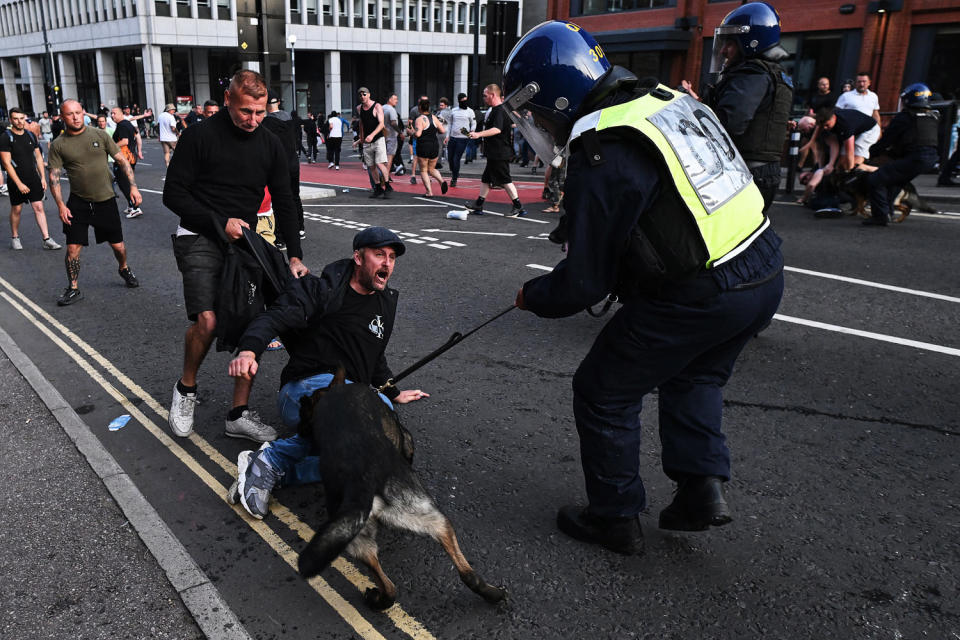LONDON — The United Kingdom woke up Sunday morning to city streets covered in debris and smoldering rubbish as a weekend of far-right, anti-immigration demonstrations — stoked by conspiracy theories spread on social media — erupted into violence in seven cities across the nation.
Police arrested at least 100 people, and riot police wearing helmets and holding shields came out in force as Prime Minister Keir Starmer pledged to take action against “extremists.”
On Saturday, groups in Leeds waving St. George’s Cross flags, England’s national flag regularly flown by far-right groups, shouted “Muslims off our streets,” pairing it with a slur suggesting they were criminal child abusers. In the city of Hull, rioters threw bottles and smashed a window at a hotel housing asylum-seekers as demonstrators clashed with police.
What started as targeted anti-immigration demonstrations quickly descended into directionless disorder. A library in Liverpool, reopened in 2023 as an “education to employment” service for people of all abilities, was set ablaze.
One police officer in the city was hit on the head with a chair and another kicked and knocked off his motorcycle. The police force responsible for the region has confirmed that two officers were taken to the hospital with injuries.


Starmer denounced the violence Saturday, saying that the right to freedom of expression and violent disorder were “two very different things,” adding that “there is no excuse for violence of any kind.”
Some of the protests did not turn violent. In the southwest city of Bristol, groups shouted “we want our country back,” while others chanted “England ‘til I die.” There were also clashes with counterprotesters singing “racist scum, off our streets.”
The latest demonstrations follow a week of riots in the country after three young girls were killed in a knife attack at a Taylor Swift-themed dance party in the town of Southport. At the center of the demonstrations was a conspiracy theory, spread on social media, based on a lie that the perpetrator was Muslim, an asylum-seeker or both.
Less than three hours after the attack on the girls, AI-generated images were shared on X by an account called Europe invasion, depicting a man in traditional Muslim dress waving a knife outside the U.K.’s houses of Parliament. The post has since been viewed over 900,000 times.
A TikTok account with no previous content that called for protests near the attack site also amassed almost 60,000 views within hours, a spokesperson for Tech Against Terrorism told The Guardian.


And so the nation was only briefly united in mourning for the girls before their hometown of Southport was beset by violence as a group of mostly white men threw bottles and bricks at police officers and a mosque.
Reporting restrictions that had prevented the naming of the suspect, who is under the age of 18, were eventually lifted in order to stop the spread of misinformation after a false name circulated online.
As it happens, the suspect Axel Rudakubana, 17, was born in the Welsh capital of Cardiff and had lived for years in a village near Southport itself, police said. The motive behind the stabbings remains unknown.
But the violence has continued all the same by a far right galvanized by a surge in support in the U.K.’s recent general elections and its long-standing perception that mass immigration is draining the nation’s resources and threatening its children.
And in another sign of the far right’s effective online presence, the call to mobilize has been spearheaded by a number of influential figures who command a sizable following but are absent on the ground.
Founder of the far-right English Defence League Tommy Robinson — who last week fled Britain, where he was due to be in court over alleged contempt proceedings — was among the first to call for nationwide protests, urging his 800,000 X followers to “hit the streets.” Other online personalities such as internet influencer Andrew Tate, who remains in Romania as he prepares to stand trial on sex trafficking charges, said in a video on X that the attacker was an “illegal immigrant.”
More than 30 protests were planned for the weekend, and thousands of extra riot police are on standby with further demonstrations expected on Sunday.
About 100 demonstrators supporting refugees gathered early Sunday afternoon outside a hotel in Rotherham that is believed to house asylum-seekers, chanting “refugees are welcome here,” as groups opposing asylum-seekers threw objects at the hotel, smashing windows and setting fire to a garbage can. According to the BBC, at least one police officer has been injured.


Britain’s policing minister told BBC Radio on Sunday that there would be “consequences” for those who “go out and attack our police officers, loot shops, destroy property and intimidate communities.” A chorus of police constables across the nation have also condemned the violence.
While the center-left Labour Party recently won a landslide victory in the U.K.’s July elections, that leftward shift was paired with rising support for the far-right Reform U.K. party, which won 4 million votes.
And Labour’s success was at least partly down to the far right’s rising popularity, which split the right-wing vote, causing many Conservative lawmakers to lose their seats in Parliament.
The latest demonstrations puncture any idea that Starmer’s center-left government has evaded an ascendant hard-right movement that continues to rise on the continent. Behind his majority, there remains an angry and active far-right undercurrent that continues to make itself heard.
This article was originally published on NBCNews.com







